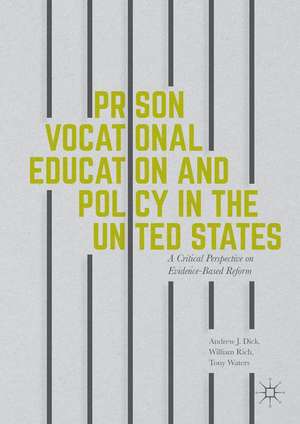Prison Vocational Education and Policy in the United States: A Critical Perspective on Evidence-Based Reform
Autor Andrew J Dick, William Rich, Tony Watersen Limba Engleză Hardback – 5 aug 2016
Preț: 644.30 lei
Preț vechi: 758.01 lei
-15% Nou
Puncte Express: 966
Preț estimativ în valută:
123.29€ • 134.34$ • 103.89£
123.29€ • 134.34$ • 103.89£
Carte tipărită la comandă
Livrare economică 23 aprilie-07 mai
Preluare comenzi: 021 569.72.76
Specificații
ISBN-13: 9781137564689
ISBN-10: 1137564687
Pagini: 303
Ilustrații: XV, 319 p.
Dimensiuni: 148 x 210 x 24 mm
Greutate: 0.53 kg
Ediția:1st ed. 2016
Editura: Palgrave Macmillan US
Colecția Palgrave Macmillan
Locul publicării:New York, United States
ISBN-10: 1137564687
Pagini: 303
Ilustrații: XV, 319 p.
Dimensiuni: 148 x 210 x 24 mm
Greutate: 0.53 kg
Ediția:1st ed. 2016
Editura: Palgrave Macmillan US
Colecția Palgrave Macmillan
Locul publicării:New York, United States
Cuprins
Preface: A Study of Vocational Education in California Prisons.- List of Tables.- List of Figures.- SECTION I.- 1. Structure and Thesis of the Book.- 2. Applied Research in California's Prisons.- 3. Prison Logic Meets Educational Research Logic: The Undiscussables of Evidence-Based Decision Making.- SECTION II- The Report.- 4. Vignette: Could the Prisoner be My Son?.- 5. Report: Vocational Education in California Prisons: A Comprehensive Evaluation of Twelve Courses.-6. Literature Review.-7. Vignette: Sunglasses.-8. Vignette: Greenhouses.- 9. Report: Methods.- 10. Report: Results and Research Questions.- 11. Vignette: Shifting Bureaucratic Sands and Work Stoppages.- 12. Vignette: I’m All Good.- 13. Report: Discussion.- 14. Vignette: Educators Only Whisper in a Custody World.- 15. Recommendations and Conclusion.- 16. Vignette: Denial of Love and The Birds of Prison.- 17. Life Without Parole and “Could be Worse”.- SECTION III.- 18. Evidence Based Decision Making and the Rise and Fall of Rehabilitation in California’s Prisons 2005-2012.- References.
Notă biografică
Andrew J. Dick (deceased) was Professor of Sociology at California State University, Chico, USA. He taught research methods, juvenile delinquency, and social problems among other classes. He also conducted long-term research on the efficacy of peer courts as a tool for rehabilitation, as well as other sociological subjects.
William Rich is Professor Emeritus at California State University, Chico, USA, where he taught graduate courses in Educational Leadership and Curriculum in the School of Education. Additionally, he served as school district consultant in policy re-design based on participative inquiry processes that uncover local cultural biases and organizational barriers to success. He has held positions as private and public school teacher, public school administrator, and university professor.
Tony Waters is Professor of Sociology at California State University, Chico, USA, and beginning in 2016, Professor of Peace Studies at Payap University, Chiangmai, Thailand. He has taught Criminology, Social Theory, and Cultural Theory among other subjects. His past writing includes titles in classical social theory, violence, criminology, and refugees. He has published several books on these topics, including Schooling, Childhood, and Bureaucracy (2012), and Weber's Rationalism (2015) as well as Crime and Immigrant Youth (1999), and When Killing is a Crime (2007).
Textul de pe ultima copertă
This book explores California’s prison system in the context of vocational education reform. For prisons in the early twenty-first century, ideologies of evidence-based management meant that reform efforts to change the purpose of prisons from punishment to rehabilitation through vocational education required “evidence” to justify policy prescriptions. Yet who determines what constitutes evidence? In political environments, solutions are typically pre-conceived, which means that the nature of the evidence collected is also preconceived. As a result, key assumptions about outcomes are often wished away to show improvement and be accountable. Through a detailed analysis interspersed with stories from the authors’ experiences “behind the wall” among California’s prison population, the authors challenge the nature of evidence-based research as used in the prison environment. In the process they describe the thorny problems facing reformers.
